F1GMAT: What are some of the advantages of having Tuck School of Business in Hanover?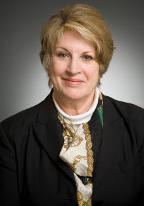 Christie St-John : Most people who visit tell me that they are always amazed by how friendly people are at Tuck and they see that the students, professors and staff actually do know each other and have conversations in the hallway and the cafeteria. This is often in contrast to what they see at other schools., Although everyone’s website talks about ‘community’ and ‘collaboration’, at Tuck it is true. Also, by being located outside a big city, our students learn to make their own fun and this in turn, helps them create very strong bonds of friendship – and they learn new things too, such as tripod hockey, how to make maple syrup, and deep international cultural understanding. Another one of the pluses of being in Hanover is that corporate recruiters love to come here. We treat them well, and this is the sort of place that is relaxed and convivial. The recruiters often stay all day rather than just stopping in for an hour or so. There is something very tranquil too about looking out the window and seeing the snow covering the mountains, or in spring, the first green buds appearing on the trees. This is a relatively stress-free environment (except for the academics!) and I think students appreciate being out of the hustle and bustle of a city for the two years they are here.
Christie St-John : Most people who visit tell me that they are always amazed by how friendly people are at Tuck and they see that the students, professors and staff actually do know each other and have conversations in the hallway and the cafeteria. This is often in contrast to what they see at other schools., Although everyone’s website talks about ‘community’ and ‘collaboration’, at Tuck it is true. Also, by being located outside a big city, our students learn to make their own fun and this in turn, helps them create very strong bonds of friendship – and they learn new things too, such as tripod hockey, how to make maple syrup, and deep international cultural understanding. Another one of the pluses of being in Hanover is that corporate recruiters love to come here. We treat them well, and this is the sort of place that is relaxed and convivial. The recruiters often stay all day rather than just stopping in for an hour or so. There is something very tranquil too about looking out the window and seeing the snow covering the mountains, or in spring, the first green buds appearing on the trees. This is a relatively stress-free environment (except for the academics!) and I think students appreciate being out of the hustle and bustle of a city for the two years they are here.
F1GMAT: What are the entry criteria in terms of the number of years of experience/GMAT/GPA for Tuck Full-time MBA program?
Christie St-John : We are more about quality than quantity, whether this pertains to number of years work experience or test scores. However, since our program is very small compared to some of our peers, we are also selective. We want students to come in with work experience. This both benefits them in understanding what they are studying, and benefits their classmates during group discussions. The range of experience goes from 2 to 14 years of work. The average is 5 years.
The GMAT score should be strong, especially in the quantitative area. The range last year was 560-790, with an average of 716. The GPA is counted in statistics only for US schools with a 4.0 grading system, and the average last year was 3.5. We do look at all student transcripts very carefully and if we see that the student has not taken very challenging classes, or that they have not done well in several classes, we would be very wary of admitting them. Our program is quite rigorous and we want everyone here to be successful. We counsel students to take Quant classes before they even apply to business school. It will make them more competitive and also make their life much easier when they are enrolled.
F1GMAT: What is the biggest misconception about Tuck Dartmouth MBA programs?
Christie St-John : The biggest misconception is that because we are in a small town in New Hampshire there won’t be much diversity in the student body. Visitors are impressed by the number of non-US students they meet while they are here. People also often think that because Dartmouth is an Ivy League school that our students will be somewhat snobbish or elitist, but that is not the case. The atmosphere here is very friendly, open minded, tolerant and respectful of others.
F1GMAT: Latest statistics shows that 34% of MBA candidates are of International origin. What attracts International students to Tuck’s MBA program?
Christie St-John : Personally, if I were an international student applying to business school, I would definitely come to Tuck if I could. Why? Because we are such a small, supportive community that our international students have a great experience. They are not thrown out into a big city where they have to find a place to live, figure out the transportation system, learn where to shop, etc. And their families are incorporated into the Tuck community as well. Our Tuck Partners Club is very active and seeks to include all Tuck partners and children, many of whom are international. I think it helps them ease into a new culture gradually, and takes away a lot of the stress accompanying any uprooting from one’s friends and family. Also, the Tuck brand is recognized by the folks who hire MBAs and we attract top companies all over the world who know and appreciate the quality of our students.
F1GMAT: Every school promotes its MBA program with some common marketable components like Accreditations, ROI, Job prospects and Unique learning methodologies. What makes Tuck stand out from the competition?
Christie St-John : There are so many things that I could write a book about it! As mentioned above, we attract top corporate recruiters who hire our students. We also have a wonderful Speaker Series where experts in many fields come to speak to the students, and then . stay on campus to hold office hours and have lunch with students. We have conferences in almost every area of interest, such as Private Equity, Digital Strategy, Climate Issues and Clean Energy, Business and Society, Health Care Issues, Entrepreneurship, International Conferences focused on India, China, Europe, or South America, New Technology and more. One of the most important aspects of academics at Tuck is our faculty. Every member of the faculty teaches in the program. We don’t have Ph.D. students teaching our MBA students, and the students have the opportunity to work with the leading minds in business research. At some schools, research faculty is just that: they research but do not teach. At Tuck, our faculty are renowned scholars and excellent teachers. To sum it up in one word, the uniqueness of Tuck is accessibility, be that faculty, visiting VIPs, alumni or staff.
F1GMAT: Has the state of the economy affected Tuck MBA's job prospects?
Christie St-John : As in the “real world” so it was in business schools. There was a great deal of turmoil these last couple of years, and yet we ended up ahead of all of our peer schools. This was partly because of the huge effort by the Career Development Office and also by alumni who came to Tuck to counsel students who were still job searching. That is the kind of experience that is common at Tuck but not always elsewhere. Things have righted themselves now and so far, we have a majority of the class with full-time and summer offers. Our students are so well prepared, so smart, and so good at team work and leadership, that we know they will find their dream job
F1GMAT: What are some of the unique courses offered in Tuck’s Full-time MBA program? How will these courses help MBA students?
Christie St-John : I think our Leadership Program is certainly unique. We recently inaugurated the Center for Leadership under the supervision of Professor Pino Audia, wherein students are intimately involved in not only learning new leadership strategies, but also in developing their own personal leadership plan for business, personal and community roles they will undertake.
Tuck has developed curricular and other activities that move the leadership-development process forward. All first-year students take the Personal Leadership course, during which they compare how they see themselves with how others see them. This can be a powerful educational experience that serves as the basis for a personal leadership plan. Students use their plans to understand which behaviors they need to develop and what opportunities they will need to do so.
Also, Tuck's unique Research-to-Practice Seminars were designed by our faculty to advance the critical thinking skills of our graduates. As students in these small seminars discuss a professor's current research, they gain insight into the way top-level researchers go about knowledge creation. The simultaneous result is to teach students to be intellectually skeptical, to test ideas against both theory and data.
Finally, but certainly not last, the Tuck Global Consultancy is a field-study course in which students work with companies and NGOs operating outside the United States. On-site consulting projects of three weeks are carried out by small teams of students working under the supervision of advisors who have extensive consulting experience. As they learn more about consulting, Tuck students also learn how to operate effectively in new environments and cultures.
F1GMAT: What are some of the defining characteristics that you look for in a potential Tuck MBA candidate?
Christie St-John : Since we are a small program, we want people here who really want to be at Tuck and who appreciate what we stand for. They should be very strong academically, have interesting work experience, be active in their community, and be willing to try new things and get outside of their comfort zone to experience all that we have to offer.
F1GMAT: Can you give our readers a demographic snapshot of the Full-time MBA program?
Christie St-John : 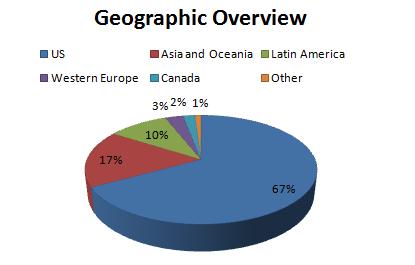
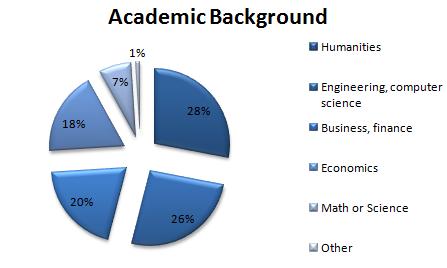
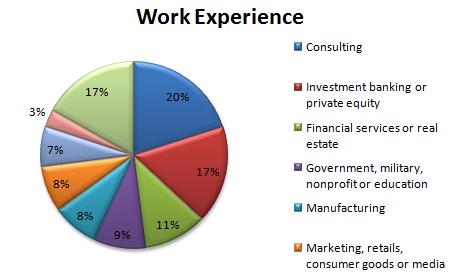
Interesting Facts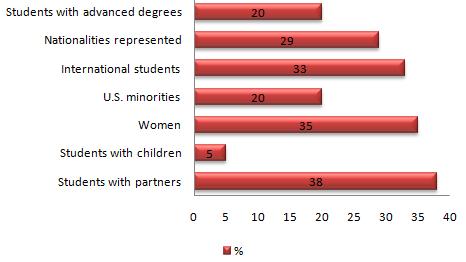
About Christie St-John Christie St-John studied in Italy for two years and then worked in Monte Carlo, Monaco for six years, first in marketing, then in oil and gas trading. She returned to the United States to complete her M.A. and Ph.D. degrees at Vanderbilt University. Christie is the Senior Associate Director of Admissions at the Tuck School of Business at Dartmouth College since 2004, where she focuses on recruiting and mentoring international students.
Christie St-John studied in Italy for two years and then worked in Monte Carlo, Monaco for six years, first in marketing, then in oil and gas trading. She returned to the United States to complete her M.A. and Ph.D. degrees at Vanderbilt University. Christie is the Senior Associate Director of Admissions at the Tuck School of Business at Dartmouth College since 2004, where she focuses on recruiting and mentoring international students.
Essay 1: Why are you pursuing an MBA and why now? How will the distinct Tuck MBA contribute to achieving your goals and aspirations? What particular aspects of Tuck will be instrumental in your growth? (300 words)
Essay 2: Tell us who you are. How have your values and experiences shaped your identity and character? How will your unique background contribute to Tuck and/or enhance the experience of your classmates? (300 words).
Essay 3: Describe a time when you meaningfully invested in someone else’s success without immediate benefit to yourself. What motivated you, and what was the impact? (300 words).
